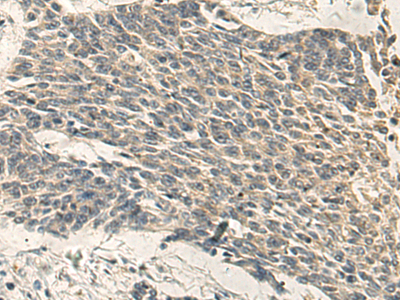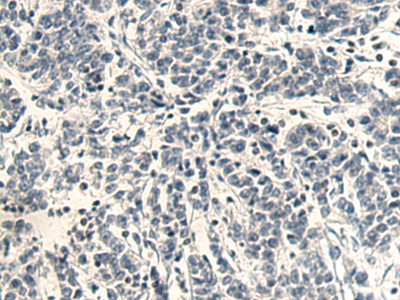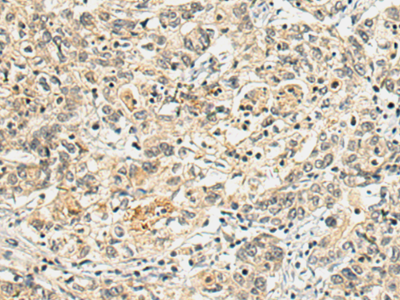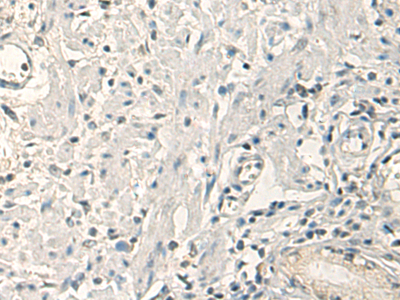| Cat.#: S222163 |
| Product Name: Anti-PRKCH Rabbit Polyclonal Antibody |
| Synonyms: PKCL; PKC-L; PRKCL; nPKC-eta |
| UNIPROT ID: P24723 (Gene Accession – NP_006246 ) |
| Background: Calcium-independent, phospholipid- and diacylglycerol (DAG)-dependent serine/threonine-protein kinase that is involved in the regulation of cell differentiation in keratinocytes and pre-B cell receptor, mediates regulation of epithelial tight junction integrity and foam cell formation, and is required for glioblastoma proliferation and apoptosis prevention in MCF-7 cells. In keratinocytes, binds and activates the tyrosine kinase FYN, which in turn blocks epidermal growth factor receptor (EGFR) signaling and leads to keratinocyte growth arrest and differentiation. Associates with the cyclin CCNE1-CDK2-CDKN1B complex and inhibits CDK2 kinase activity, leading to RB1 dephosphorylation and thereby G1 arrest in keratinocytes. In association with RALA activates actin depolymerization, which is necessary for keratinocyte differentiation. In the pre-B cell receptor signaling, functions downstream of BLNK by up-regulating IRF4, which in turn activates L chain gene rearrangement. Regulates epithelial tight junctions (TJs) by phosphorylating occludin (OCLN) on threonine residues, which is necessary for the assembly and maintenance of TJs. In association with PLD2 and via TLR4 signaling, is involved in lipopolysaccharide (LPS)-induced RGS2 down-regulation and foam cell formation. Upon PMA stimulation, mediates glioblastoma cell proliferation by activating the mTOR pathway, the PI3K/AKT pathway and the ERK1-dependent phosphorylation of ELK1. Involved in the protection of glioblastoma cells from irradiation-induced apoptosis by preventing caspase-9 activation. In camptothecin-treated MCF-7 cells, regulates NF-kappa-B upstream signaling by activating IKBKB, and confers protection against DNA damage-induced apoptosis. Promotes oncogenic functions of ATF2 in the nucleus while blocking its apoptotic function at mitochondria. Phosphorylates ATF2 which promotes its nuclear retention and transcriptional activity and negatively regulates its mitochondrial localization. |
| Immunogen: Synthetic peptide of human PRKCH |
| Applications: ELISA, IHC |
| Recommended Dilutions: IHC: 50-100; ELISA: 5000-10000 |
| Host Species: Rabbit |
| Clonality: Rabbit Polyclonal |
| Isotype: Immunogen-specific rabbit IgG |
| Purification: Antigen affinity purification |
| Species Reactivity: Human, Mouse, Rat |
| Constituents: PBS (without Mg2+ and Ca2+), pH 7.4, 150 mM NaCl, 0.05% Sodium Azide and 40% glycerol |
| Research Areas: Signal Transduction, Metabolism |
| Storage & Shipping: Store at -20°C. Avoid repeated freezing and thawing |

Immunohistochemistry analysis of paraffin embedded Human colorectal cancer using 222163(PRKCH Antibody) at a dilution of 1/35(Cytoplasm). | 
In comparision with the IHC on the left, the same paraffin-embedded Human colorectal cancer is first treated with the synthetic peptide and then with 222163(Anti-PRKCH Antibody) at dilution 1/35. | 
The image on the left is immunohistochemistry of paraffin-embedded Human gastric cancer using 222163(Anti-PRKCH Antibody) at a dilution of 1/35. | 
In comparision with the IHC on the left, the same paraffin-embedded Human gastric cancer is first treated with synthetic peptide and then with D264156(Anti-PRKCH Antibody) at dilution 1/35. |
|














